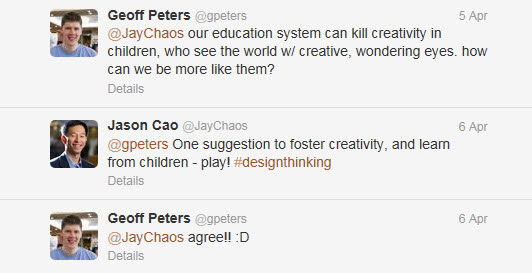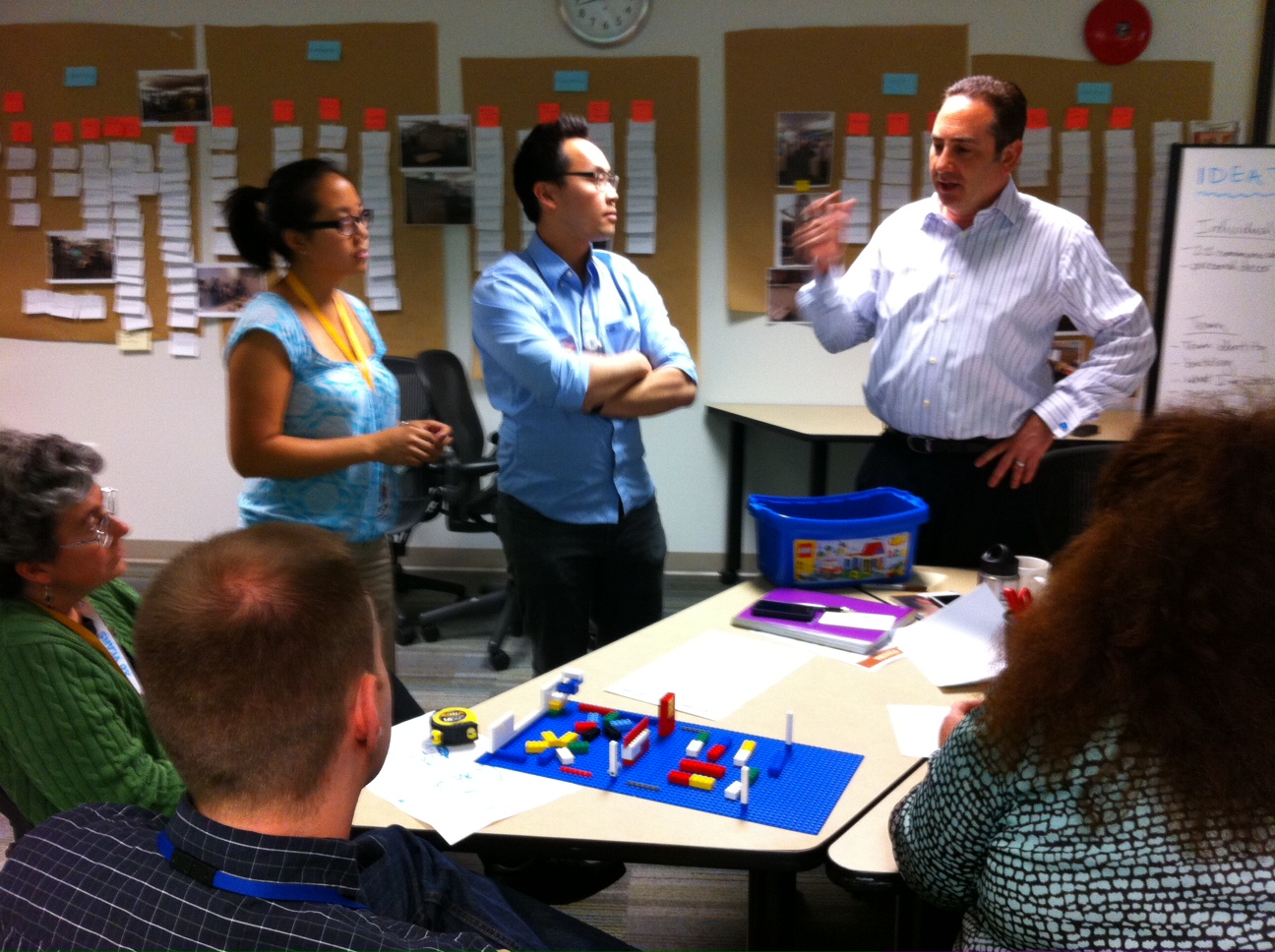
- SAP Community
- Groups
- Interest Groups
- Application Development
- Blog Posts
- Creativity - Nature or Nurture?
- Subscribe to RSS Feed
- Mark as New
- Mark as Read
- Bookmark
- Subscribe
- Printer Friendly Page
- Report Inappropriate Content
I love to contemplate questions like these, especially in the context of Design Thinking.
When I posted this question via Twitter, I got the following response from @gpeters, which I loved because it got me to think more about my current level of creativity.

I think we are born curious and creative. The Merriam-Webster Encyclopedia describes creativity as an "Ability to produce something new through 
imaginative skill, whether a new solution to a problem, a new method or device, or a new artistic object or form." It is this creative ability that has set humans apart from the rest of the animal kingdom, and brought us people like Beethoven, Leonardo da Vinci, Frida Kahlo, Steve Jobs and Woody Allen (by the way, I don't expect you to agree with these examples). Some would describe these people as "geniuses" - although studies have shown that there is very little relationship between creativity and intelligence. I'll call these people creative geniuses.
(Image: http://www2.ivcc.edu/jbeyer/Web%20Pages/Woody%20Allen.htm)
Have adults lost their creativity?
I think it is through the combination of understanding and lack of understanding that we've suppressed this natural gift.

Here's what I mean:
- Our society prefers order to chaos. We create rules, laws and government to help us maintain this order. This is a good thing, because it protects the rights and properties of citizens. However, when bureaucracies hold back its own citizens from effectively solving the problems that matter to them, this intended-order becomes a disservice.
- I'm with Geoff when comes to our education system - I can see first-hand how good intentions are limiting our children's ability to experiment and imagine. For example, early childhood education methods encourage curiosity and exploration on the one hand - as long as you remember to put the round peg in the round hole. Contradictions are discouraged, disorder is frowned upon, introversion is misunderstood, and a little day-dreaming is too quick to be diagnosed as ADHD. I am not trying to relabel misbehaving kids as creative kids. Rather, I am asking what if this was a little Beethoven or Frida inside - how can we help this creativity grow?
(Image: http://www.apartmenttherapy.com/montessori-toys-61459)
How do we get this creativity back?

I'll never forget Yao Ming's keynote presentation at SAPPHIRENOW 2011 in Beijing, where he spoke to a packed crowd of over 10,000 attendees. His message was simple - for China to get recognized as a world leader in innovation, every parent must first let their child fail. Yao explained that for too long, the One-Child Policy has caused parents to protect their only-child and avoid risks at any cost (Yao is also an only-child), resulting in a society and economy known for their ability to copy rather than to innovate. Only when this younger generation is allowed to experiment, make mistakes and learn from these mistakes is it possible for China to showcase its true creative potential.
This message stuck with me because it can be applied in many ways. At this time, it applies to the enablement of creativity. I believe that children and adults alike need the time, space and freedom to fail. For some, this fear of failure is so great that parents and leaders must take the first step, and give permission to fail in order to uncover the creativity within.
Once we've uncovered our natural creativity, I believe we can support its growth by bringing PLAY back into our lives. In a Design Thinking workshop at the SAP Vancouver office last week, we were joined by SAP's Chief Marketing Officer, jonathan.becher, to brainstorm ideas and create prototypes for our future workspace. This was an opportunity to take off our jackets and have some fun with colours, shapes and our imagination! The prototype and result isn't as important as the process we went through in dreaming and co-creating with each other. I believe we can add a bit more play and fun into everything we do.


Whether you think creativity is something you're born with or something that can be learned, I'd like to know - how can we be more creative?
- SAP Managed Tags:
- Design Thinking
You must be a registered user to add a comment. If you've already registered, sign in. Otherwise, register and sign in.
-
A Dynamic Memory Allocation Tool
1 -
ABAP
9 -
abap cds
1 -
ABAP CDS Views
14 -
ABAP class
1 -
ABAP Cloud
1 -
ABAP Development
5 -
ABAP in Eclipse
2 -
ABAP Keyword Documentation
2 -
ABAP OOABAP
2 -
ABAP Programming
1 -
abap technical
1 -
ABAP test cockpit
7 -
ABAP test cokpit
1 -
ADT
1 -
Advanced Event Mesh
1 -
AEM
1 -
AI
1 -
API and Integration
1 -
APIs
9 -
APIs ABAP
1 -
App Dev and Integration
1 -
Application Development
2 -
application job
1 -
archivelinks
1 -
Automation
4 -
B2B Integration
1 -
BTP
1 -
CAP
1 -
CAPM
1 -
Career Development
3 -
CL_GUI_FRONTEND_SERVICES
1 -
CL_SALV_TABLE
1 -
Cloud Extensibility
8 -
Cloud Native
7 -
Cloud Platform Integration
1 -
CloudEvents
2 -
CMIS
1 -
Connection
1 -
container
1 -
Customer Portal
1 -
Debugging
2 -
Developer extensibility
1 -
Developing at Scale
3 -
DMS
1 -
dynamic logpoints
1 -
Dynpro
1 -
Dynpro Width
1 -
Eclipse ADT ABAP Development Tools
1 -
EDA
1 -
Event Mesh
1 -
Expert
1 -
Field Symbols in ABAP
1 -
Fiori
1 -
Fiori App Extension
1 -
Forms & Templates
1 -
General
1 -
Getting Started
1 -
IBM watsonx
2 -
Integration & Connectivity
10 -
Introduction
1 -
JavaScripts used by Adobe Forms
1 -
joule
1 -
NodeJS
1 -
ODATA
3 -
OOABAP
3 -
Outbound queue
1 -
ProCustomer
1 -
Product Updates
1 -
Programming Models
14 -
Restful webservices Using POST MAN
1 -
RFC
1 -
RFFOEDI1
1 -
SAP BAS
1 -
SAP BTP
1 -
SAP Build
1 -
SAP Build apps
1 -
SAP Build CodeJam
1 -
SAP CodeTalk
1 -
SAP Odata
2 -
SAP SEGW
1 -
SAP UI5
1 -
SAP UI5 Custom Library
1 -
SAPEnhancements
1 -
SapMachine
1 -
security
3 -
SM30
1 -
Table Maintenance Generator
1 -
text editor
1 -
Tools
18 -
User Experience
6 -
Width
1
| User | Count |
|---|---|
| 4 | |
| 4 | |
| 3 | |
| 3 | |
| 2 | |
| 1 | |
| 1 | |
| 1 | |
| 1 | |
| 1 |